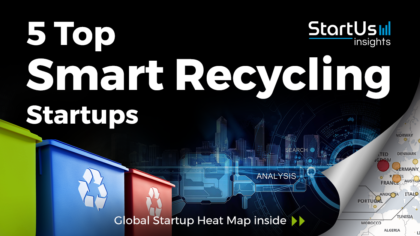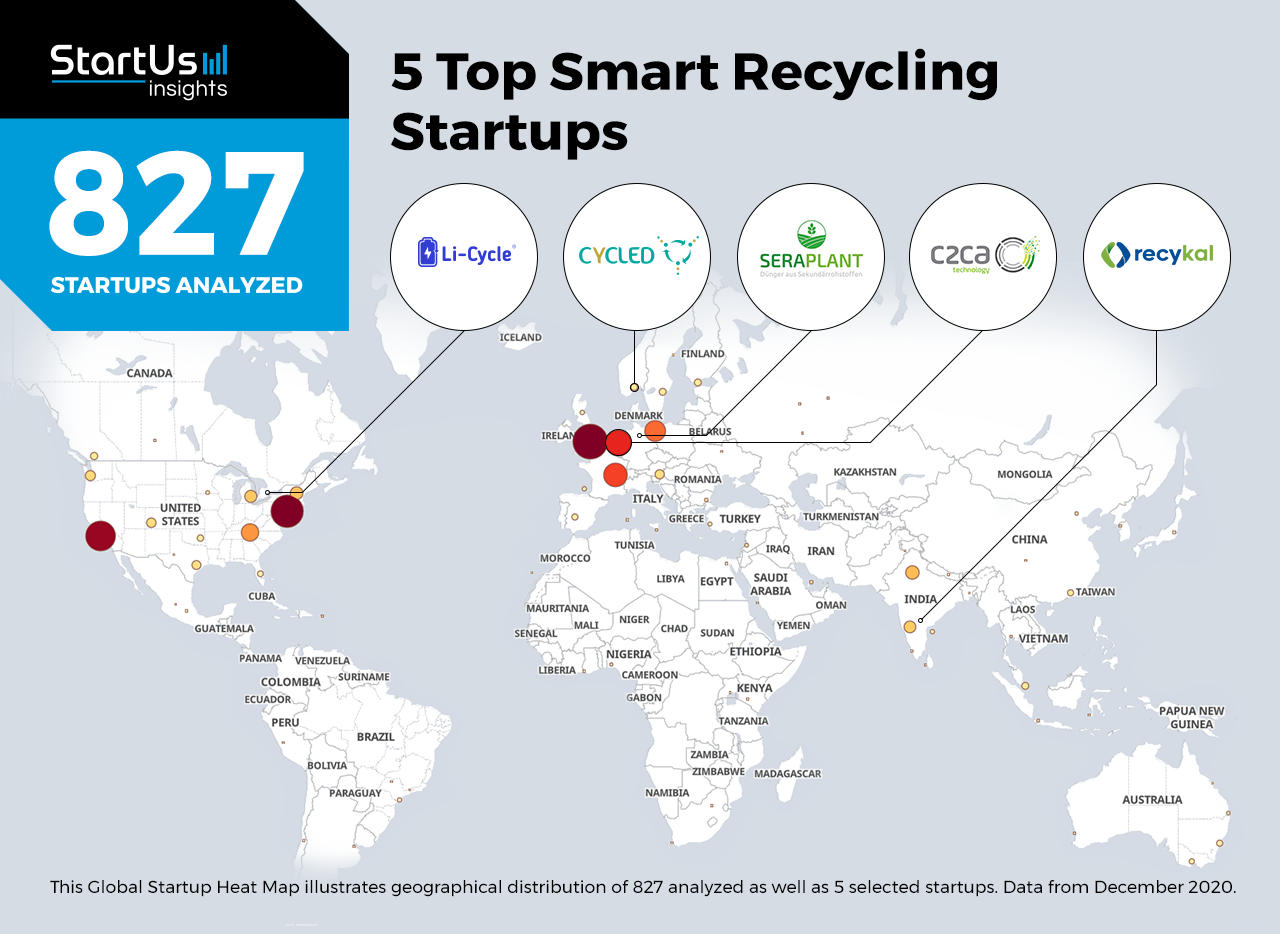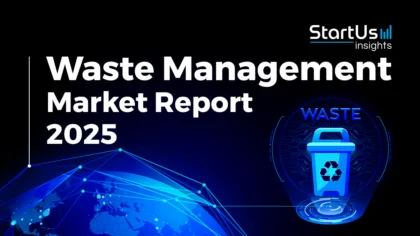Accelerate Productivity in 2025
Reignite Growth Despite the Global Slowdown
Staying ahead of the technology curve means strengthening your competitive advantage. That is why we give you data-driven innovation insights into the smart city sector. This time, you get to discover 5 hand-picked startups developing smart recycling solutions.
Global Startup Heat Map highlights 5 Top Smart Recycling Solutions out of 827
The insights of this data-driven analysis are derived from the Big Data & Artificial Intelligence-powered StartUs Insights Discovery Platform, covering 1.379.000+ startups & scaleups globally. The platform gives you an exhaustive overview of emerging technologies & relevant startups within a specific field in just a few clicks.
The Global Startup Heat Map below reveals the distribution of the 827 exemplary startups & scaleups we analyzed for this research. Further, it highlights 5 smart city startups that we hand-picked based on criteria such as founding year, location, funding raised, and more. You get to explore the solutions of these 5 startups & scaleups in this report. For insights on the other 822 smart recycling solutions, get in touch.
Recykal implements a Smart Collection Center
Despite the fact that most products are not recycled, waste collection, sorting, and recycling centers find it difficult to manage the waste that they receive. High requirements of human labor and its associated safety concerns currently make recycling an expensive business. To help waste collection startups increase productivity and waste availability, startups build easy-to-use smartphone and web-based apps. By digitizing their operations, waste management facilities improve transparency and visibility on a day-to-day basis.
Indian startup Recykal develops various digital waste-commerce solutions to implement end-to-end transparency for recycling centers. The startup’s Smart Centre Solution improves the efficiency of collection center operations by digitizing their day-to-day activities such as record-keeping settlements, and transactions. It provides digital order, inventory, and payments management while also helping waste management companies to easily onboard their clients. Recykal’s solutions help waste aggregators, dry resource collection centers (DRCCs), and material recovery facilities gain visibility into their business as well as reduce operational costs.
CYCLED builds Smart Bins
A major factor that prevents people from recycling is the tedious nature of current recycling processes. Several cities globally are implementing or upgrading their waste recycling infrastructure, such as segregated waste bins, collection facilities, and dedicated logistics. Startups work on novel solutions that incentivize and reward people for recycling their waste. Together, such solutions aim to recycle a large portion of waste streams across industries.
CYCLED is a Norwegian startup building a waste management platform using blockchain-based incentives and a smart bin. In their two-pronged approach to building a circular waste management economy, the CYCLED App connects food packaging companies with recycling centers as well as consumers with recyclables collection centers. The CYCLED Smart Bin utilizes cameras and AI to automatically sort and reward people who recycle plastics, metal, and paper. The startup is looking to expand the smart bin’s capabilities to recycle glass and organics as well.
SERAPLANT develops Phosphorus Recycling Technology
Phosphorus plays an important role in helping humans and other animals maintain and build bones. Conventional phosphorus manufacturing is toxic and consumes a large amount of energy. However, it is also found in many food products, and as a result, in agricultural waste streams as well. Further, phosphorus is present in industrial waste effluents and wastewater streams. Startups build innovative recycling technologies for recovering phosphorus from such waste streams.
German startup SERAPLANT offers recycled phosphorus-based fertilizers to promote sustainable agriculture. Using a phosphorus recycling technology, jointly developed with GLATT, the startup produces phosphorus-containing fertilizer. The startup’s process involves mixing sewage sludge ash to make it reactive to chemical bonding, before spraying, granulating, and fractionating the waste. Moreover, the process does not produce dangerous intermediate products and toxic exhaust gases. The fertilizer also contains significantly lower proportions of uranium and cadmium, making it ideal for agriculture.
C2CA Technology enables Concrete Recycling
According to recent studies, if cement production were a country, it would be the world’s third-largest emitter of greenhouse gases (GHGs). The most popular construction material globally, cement, or concrete, is also cheaper to recycle than it is to move rubble to landfills. Startups develop novel solutions to help construction companies reduce their carbon emissions and adopt sustainable practices. Solutions span carbon-free cement and new construction materials to sustainable recycling of concrete.
Dutch startup C2CA Technology provides Circuton, a mobile on-site concrete recycling technology. The startup’s technology processes concrete rubble into gravel, sand, and concrete. Circuton produces lower carbon emissions than conventional concrete and enables real-time quality checks for the final concrete product. The solution allows construction companies to prevent unnecessary logistical flows and shortens the time-to-market for circular concrete.
Lithion offers Lithium-ion Battery Recycling
Humans generate large quantities of e-waste, most of which end up in landfills. However, even damaged electronic products contain valuable metals within them. By successfully separating and combining various metals, the amount of new ore mining can reduce. This prompts startups to develop safe and efficient ways of recycling e-waste, such as Lithium-ion batteries, the most popular type of batteries, found in electric vehicles (EVs) and consumer electronics.
Canadian startup Lithion uses a patent-pending hydrometallurgy-based process efficient and cost-effective Lithium-ion battery recycling. Lithion’s process enables 95% of battery components to be recycled or returned to manufacturers to make new batteries. Moreover, the startup’s recycling technology combines existing processes with new operations, designed for metallurgical extraction in an urban setting. Lithion’s hydrometallurgy-based process also enables recycling for all chemistries of Lithium-ion batteries including lithium cobalt oxide (LCO) and lithium iron phosphate (LFP), among others.
Discover more Smart City Startups
Smart city startups such as the examples highlighted in this report focus on waste collection, water management, and civic engagement. While all of these technologies play a major role in advancing smart cities, they only represent the tip of the iceberg. To explore more smart city technologies, simply get in touch to let us look into your areas of interest. For a more general overview, you can download our free Innovation Reports to save your time and improve strategic decision-making.



![Explore the 10 Emerging Smart City Trends [2025-2030]](https://www.startus-insights.com/wp-content/uploads/2025/06/Smart-City-Trends-SharedImg-StartUs-Insights-noresize-420x236.webp)




